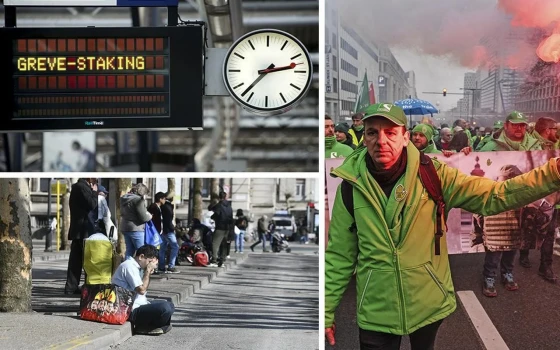
A strike in Belgium paralyzes various sectors of life, including airports, transportation, schools, and factories.

- Europe and Arabs
- Monday , 31 March 2025 10:58 AM GMT
Brussels: Europe and the Arabs
Several sectors in Belgium have been affected by the general strike called by the CSC and FGTB unions in protest against the federal government's planned pension reforms. Participation in the strike varied between 40 and 70 percent in some sectors, including air travel, particularly Brussels Airport, which announced no incoming flights, while a limited number of outgoing flights would operate. Transport was also affected at Charleroi Airport, as were internal train and bus services. Large numbers of workers and employees in various institutions participated in the strike, with schools, hospitals, and shopping malls also affected, but to varying degrees. Some sectors were careful to announce the percentage of their employees participating in the strike, while others were careful to announce a lower level of work in some institutions and facilities.
Amid growing tensions over pension reform, Pensions Minister Jan Jambon issued a clear message defending the necessity of these changes, on the eve of the general strike called by unions to protest the federal government's plans.
Jambon posted a video on social media on the eve of the strike, explaining that pension reform was inevitable, noting that rising life expectancy was leading to an unsustainable increase in pension costs. He emphasized, "We are living, on average, ten years longer than we did half a century ago. This is a positive development, but it also means that pension costs are rising significantly."
The minister addressed the retirement age dilemma, noting that many people are retiring before the legal age of 66, increasing the burden on the system.
He added, "If we don't take action, pension costs will increase by €14 billion over the next five years, making the system unsustainable."
Jambon explained that the demographic situation poses significant challenges, as the number of contributors to the system has decreased from four workers per retiree in the 1990s to three currently, and is expected to fall to only two by 2060.
In this regard, he emphasized the importance of urgent intervention, saying, "We realize that this is a difficult message, but it is our duty to ensure a sustainable pension system for our children and grandchildren."
In concluding his remarks, the minister emphasized that the reforms will be implemented gradually, taking into account social justice, noting that the government will adopt a transitional approach to mitigate the impact of the changes. The general strike taking place today, Monday, March 31, is preparing for a new round of protests in Belgium. The next general strike has been scheduled for April 29, according to Le Soir newspaper over the weekend.
This protest movement doesn't appear to be stopping there, as a timetable for further action is currently being discussed, extending until next October.
The continued union mobilization comes in response to the De Wever government's controversial reform plans, particularly regarding pension calculations and the retirement age.
The choice of April 29 was not random, as it coincides with a planned public transport strike, allowing for a broader mobilization that includes all public services, which are considered the most affected by these reforms.
The two main unions, the FGTB and the CSC, reached an agreement on Wednesday to send an official notice of the strike, this time also including the private sector.
However, the official message has not yet reached employers, leaving the door open to further tensions in the coming days. This strike comes at a critical time, just days before the May Day celebrations. The unions are seeking to exploit this opportunity to increase momentum and highlight the extent of the mobilization across the country, both in the north and south. The unions are also moving forward with a comprehensive timeline for escalating actions, and dates for strikes and other actions are expected to be announced soon, foreshadowing a heated phase of social confrontations in the coming months.












No Comments Found